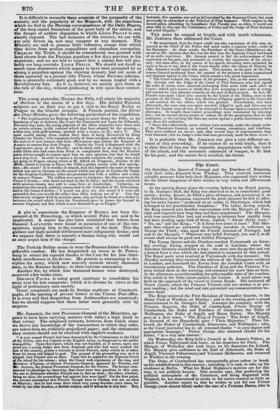The young pretender, HENRY the Fifth, will attain his majority
of thirteen in the course of a few days. His faithful Parisian subjects are on their way to pay a visit to the Royal Exiles at Prague on the blissful occasion. A French journal, the Revue des DeuxMondes, gives the following particulars of the expedition. 4 " The'Legitimatists are hocking to Prague to salute Henry the Fifth, on his becoming of age at thirteen, like Louis the Fourteenth and Louis the Fifteenth. For some days past, the young pilgrims of the fallen monarchy have been seen in certain saloons, in the costume which they have adopted for the occasion- & blue coat, with gold buttons, marked with a crown, an H., and a V. The most candid among them confess their fears of being ill-received by King Charles the Tenth; who complains loudly of these intrigues, and often says, on the arrival of new comers, that their officiousness may induce the Emperor of Austria to remove him from Prague. Charles the Tenth is displeased with the Legitimatist party of the Gazette; and he lately said, in an angry tone, to a amble Duke who had come from Paris to compliment him, that the Royalist party always sought to impose upon him its own opinions, but that he would put a stop to it. In order to insure a favourable reception, the young men who are going to Prague, among whom is M. Alfred du Fougerais, director of the Mode, intend to convey to Henry the Fifth a golden sword, with this inscrip- tion—En avant! It is worthy of remark, that this legend is the same as the one which was put in German on the sword which was given to Charles the Tenth by the Empress Catherine, when she presented him with a million and a ship to conquer France. The million was spent in intrigues ; the ship conveyed the Count d'Artois,— who dared not land on the Be Dieu; and the sword, enriched with precious stones, was sold to some Jews at Amsterdam. Catherine, on presenting this sword, publicly consecrated in the Cathedral of St. Petersburg, said to the Count d'Artois—' I would not give you this sword if I were not persuaded that you would die rather than delay making use of it.' One day this sword, stripped of all its precious stone, may perhaps be found at a broker's, between the sword which Louis the Fourteenth gave to James the Second to 'recover England, and that which is now destined to go to Prague."






















 Previous page
Previous page